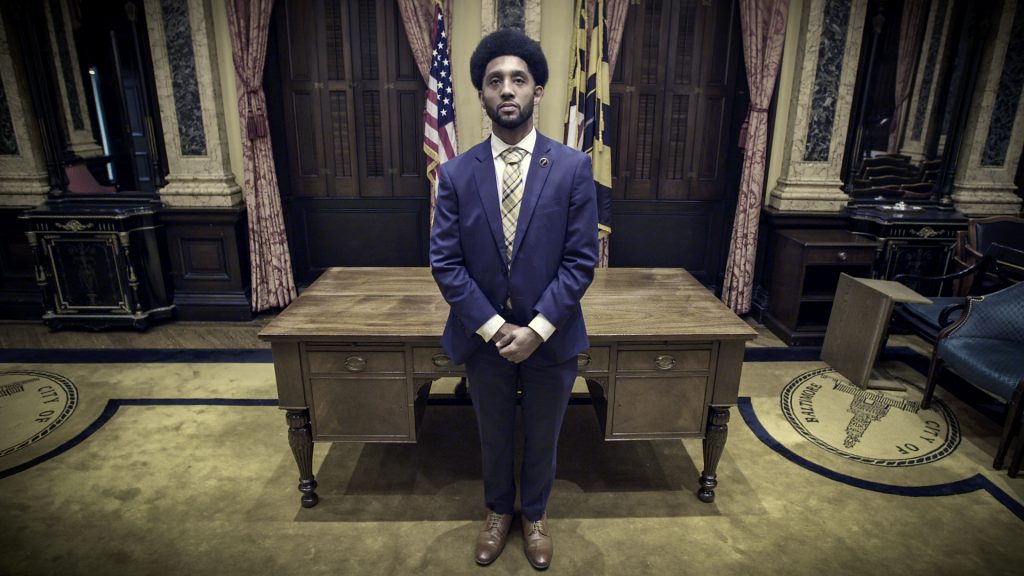‘Body Politic’ Is a Timely Documentary
Film about Baltimore Mayor Brandon Scott is a potent, polished production.
While it contains all manner of international cinema, the Milwaukee Film Festival is a particular feast for lovers of documentaries – most of which won’t get exposure in commercial cinemas, many dealing with celebrities, nature and social issues, some about drag, queer or other threatened lifestyles. Online a mammoth program guide reveals all.
Of the 131 full length films, and dozens more in the short film division, few were booked looking at what would be in the April headlines, always hard to do months in advance.
Yet one film has become hot because of news headlines: The profile of Baltimore’s young Black mayor Brandon Scott, who rose out of community organizing in a Black-majority city and had to fight longtime attitudes about rampant crime in his city. At first Scott failed badly according to crime statistics, but he persevered to astonishing success, as the documentary details. By happenstance it was one of the few festival films available to critics in advance.
But strangely enough, The Body Politic is now in the headlines because of a Baltimore catastrophe after the film was made – and because that weird right-wing rumor mill thrust Scott and the city into the headlines. It is also giving the film a political role affecting former Republican governor Larry Hogan, who is running for U.S. Senator in Maryland because Sen. Ben Cardin, who is actually featured positively in the documentary, has announced his retirement. Yet Hogan will not make Baltimore voters happy because of his skepticism about Black power in The Body Politic.
The news that makes the film hot, of course, was the end of March crash of a giant cargo ship into the Francis Scott Key Bridge. The video of the bridge collapse has been all over television.
The bridge will take years to replace and to restore harbor access because of the blocked channel to Baltimore’s port – one of the busiest in the nation. It’s clear that hundreds of thousands of jobs are in jeopardy as is much of the economy. Not just in Maryland but across the nation.
In 2007 when the US president was a Republican and there was a catastrophic bridge collapse in Minnesota, there was bipartisan unanimity that the federal government would pay despite the millions involved, just as Congress had put partisan difference aside in other calamities. Not this time.
Describing the resulting savaging his city has endured from the MAGA crowd, Mayor Scott has bluntly said the critics are using “everything but the N word” to describe his city.
Body Politic is a polished, 91-minute documentary using the on-the-street reality, rhythms and cutting techniques of the well-done professional movie; it may not establish new ground, but it sure masters the old documentary turf. The film was directed by Gabriel Francis Paz Goodenough, who earned his stripes as camera assistant and crew member of several major films and TV series. He is using much of the music and closeup techniques fondly remembered from HBO series “The Wire” (2002-2008) and other similar efforts to sear the murder-driven streets of Baltimore into our memory.
How Scott’s unlikely mayoral career unfolded — and almost came apart when murder statistics remained stubborn — makes Body Politic as exciting as a TV crime drama. In its opening moments the camera sits in the passenger seat as Scott drives through his city at night getting the blunt news on the phone about the night’s murders from an anonymous aide: “You can’t make this shit up; it’s like a movie.”
Perhaps because of shows like “The Wire,” Baltimore remains notorious in the national mind – even as we learn that it is not gang violence but domestic disputes and personal grudges that lead the murder parade, even as major crimes have been dropping noticeably in the last few years.
But Baltimore had been averaging more than 300 murders a year when Scott became mayor. Today the Baltimore murder rate has dropped 47% compared to 2021.
The documentary chronicles Scott’s stubbornness in his first years – the Covid years, as the masks on all the participants prove throughout Body Politic. The cries came from the right but also the left that his long-range ideas should be abandoned to address the murder rate today. Yet Scott argued that the old ways of relying on the police and tough sentences had not helped.
He fought for a broader unity plan that included seeking out people who used guns or were in danger of gun violence, offering jobs, training and social help. He recruited reformed felons to patrol the streets. He found political resistance on all sides when he focused on one district, ignoring many others (where the murder rate continued unchecked) to make his point.
He came into office when Republican Hogan was the governor who resisted giving monetary assistance from the many state agencies. As the movie makes painfully clear, Hogan resisted funding or backing Scott’s ideas – as did many others who saw it as bleeding heart liberalism. Ironically, since Hogan is now running for Senate and expects Republican help, his attitude toward Baltimore, along with the GOP resistance to spending federal money to rebuild the bridge and keep the port afloat, may hurt his campaign.
Body Politic has amusingly become a political weapon for any Democrat who supports Baltimore to make a better showing in November.
Let’s not pretend this isn’t a sympathetic documentary for Brandon Scott. His warmth with neighbors and children, the sort of thinking that gathers community to his side does give short shrift to the ferocious law-and-order types who think a hard hand can sweep in and save things, despite decades of failure for this approach in so many urban territories.
But the Milwaukee Film Festival in many of its offerings is giving a fascinating chance to consider big issues – a hallmark of the festival’s approach, as a Urban Milwaukee story has noted. And this film does just that.
Body Politic will be shown at 6 p.m. Friday, April 12 at the Downer Theater and 9 p.m. Sunday April 14 and again at 1 p.m. Thursday April 25 at the Times Cinema.
Three showings are typical for many of the films scheduled April 11 to April 25, which have four distinct venues for audiences – the Times, the Avalon and the Downer along with the flagship Oriental and its 3-7 p.m. daily box office. The general public can call 414-755-1965 or stop by the Oriental box office for tickets. Prices range from $15 to $8 depending on the age category and there is limited seating depending on the event and place.
Dominique Paul Noth served for decades as film and drama critic, later senior editor for features at the Milwaukee Journal. You’ll find his blog here and here.
If you think stories like this are important, become a member of Urban Milwaukee and help support real, independent journalism. Plus you get some cool added benefits.
Milwaukee Film Festival
-
Check Out These Milwaukee-Made Films At The Film Festival
 Apr 14th, 2024 by Jeramey Jannene
Apr 14th, 2024 by Jeramey Jannene
-
The Unknown Joan Baez
 Apr 11th, 2024 by Dominique Paul Noth
Apr 11th, 2024 by Dominique Paul Noth
-
‘The Taste of Things’ Is a Jewel
 Apr 9th, 2024 by Dominique Paul Noth
Apr 9th, 2024 by Dominique Paul Noth





















